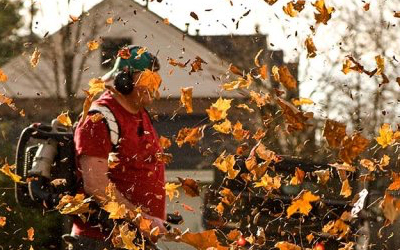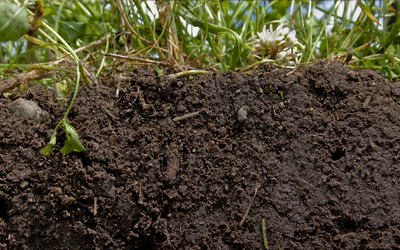Leaves
Fallen leaves shelter plant roots from excessive heat and cold, and once they decompose, they keep the soil healthy. So why do we spend millions of dollars, millions of hours and millions of gallons of diesel and gasoline to get rid of those leaves, while there is plenty of evidence that leaf blowers are:
- Extremely polluting: leaf blowers have a 30 times bigger carbon footprint than driving a passenger car. Leaf blowers account for a significant percentage of the total air pollution in this country.
- Disturb nesting and breeding of birds, harm microorganisms and other wildlife, and are bad for the soil.
- Stir up pollutants such as mold spores, fecal matter, pesticides, fertilizers, etc., and blow particulates in the air that aggravate allergies and asthma.
- Disturb neighborhood peace and quiet, raise our blood pressure and exacerbate pulmonary issues, such as bronchitis.

Leaf blowers are unhealthy for the
environment and the yard.

Leaf blowers are unhealthy
for landscapers and homeowners.

Leaves are beneficial to the environment and our yard.

Leaves turn into a beautiful nutritious and protective soil.
Yes, lawn turf grass might be smothered by excess leaves, if they are simply left in place, but it’s much better to mow right over the leaves to create mulch than to blow them away. The resulting shredded leaves will settle into the grass, providing nutrients and reducing the need for fertilizers, weed killers and insecticides. Mulch mowing is a simple affordable alternative for the use of leaf blowers. Leaf mulching requires more strength from your mower, so reel mowers can’t cope, but most regular mowers will do. Once the grass stops growing switch to mulching blades — gator blades cut through deep piles of leaves — and make sure your mower deck’s exit chute is closed, so that the leaves stay in the deck for another rotation so they get chopped into smaller pieces. Leaf mulching on lawns has many advantages. Mulched leaves will add nutrients to the soil, and create a better soil structure. Sometimes the mulching takes a little longer than regular mowing, and with a thick layer of leaves you might need to mow more often, or go over the area twice. But the lawn will be healthier and won’t need as much fertilizer or water. Discuss this practice with the yard owner. If there are many trees on the property, more labor might be required. Try to mitigate the labor costs with the savings on fertilizer or hauling costs, or maybe even suggest a size reduction of the lawn.

Use “gator” blades for thick piles of leaves.

This mulching blade will also work fine.

Ready to go
